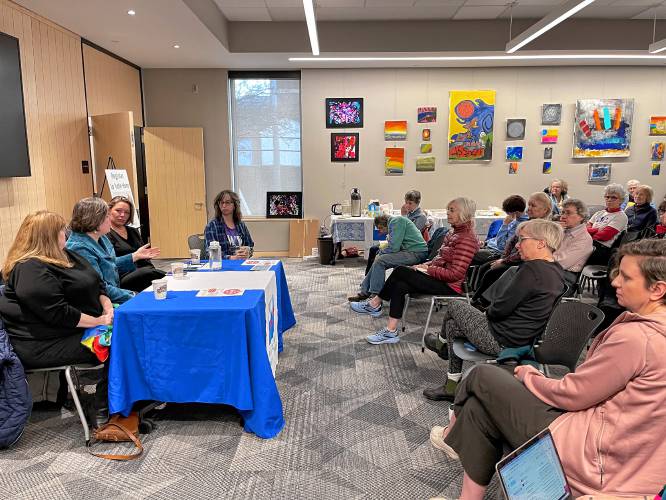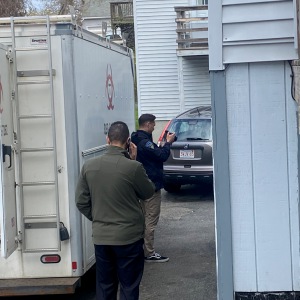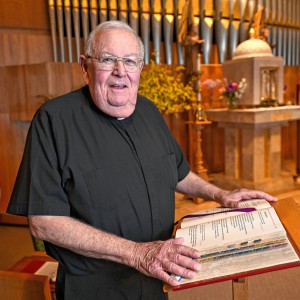Legislative Coffee attendees push for housing, road funding

Rep. Susannah Whipps, Sen. Jo Comerford and Rep. Natalie Blais answered questions and urged attendees to advocate and vote to make their voices heard during the League of Women Voters of Franklin County’s annual Legislative Coffee at the Greenfield Public Library on Saturday. FOR THE RECORDER/AALIANNA MARIETTA
| Published: 04-08-2024 12:04 PM |
GREENFIELD — Women from across Franklin County voiced their concerns on affordable housing, the PILOT program, climate action, road repairs and more to their local legislators on Saturday.
Rep. Natalie Blais, Rep. Susannah Whipps and Sen. Jo Comerford answered questions and urged attendees to advocate and vote to make their voices heard during the League of Women Voters of Franklin County’s annual Legislative Coffee at the Greenfield Public Library.
Greenfield resident Lynn Waldron kicked off the questions by asking legislators to speak on their hopes for the Affordable Homes Act, a $4 billion bill unveiled in October that aims to build more houses and decrease housing costs across the state. The act allocates $1.6 billion for the repair, rehabilitation and modernization of the state’s more than 43,000 public housing units; $200 million to support alternative rental options for seniors, veterans and those facing homelessness or recovering from substance abuse; $115 million toward ensuring new housing meets green climate standards; and $1.83 billion for housing production and preservation in the state, according to mass.gov.
“I think one of the things we have all heard often from constituents, and also know that our colleagues have heard from their constituents across the commonwealth, is that we lack affordable housing,” Blais said. “We need more housing overall for everyone.”
Although Blais said she is “grateful” for the Healey-Driscoll administration moving the act forward to increase housing, she said she is “disappointed” with the lack of focus on rural communities.
“We’ve all seen for far too long that the programs and policies that are currently in place really leave our rural communities behind,” she said.
In particular, Comerford identified the bill’s real estate transfer tax initiative as a component with little impact on Franklin County. The package of spending authorizations, policy changes and tax credits gives local communities the option to require property sellers to pay a real estate transaction fee of 0.5% to 2% on property sales over $1 million. The bill funnels the cut into local affordable housing projects, but Comerford said this benefit will barely touch Franklin County.
“If localities have this option to raise local revenue, this is not going to help, because the threshold is way too high,” she said. According to Realtor.com, the median price for a home sold in Franklin County is $309,500. “This is going to help Nantucket,” Comerford added, “but it’s not going to help Greenfield in any measurable way or any of our towns.”
Article continues after...
Yesterday's Most Read Articles
 Authorities ID victim in Greenfield slaying
Authorities ID victim in Greenfield slaying
 State records show Northfield EMS chief’s paramedic license suspended over failure to transport infant
State records show Northfield EMS chief’s paramedic license suspended over failure to transport infant
 Police report details grisly crime scene in Greenfield
Police report details grisly crime scene in Greenfield
 On The Ridge with Joe Judd: What time should you turkey hunt?
On The Ridge with Joe Judd: What time should you turkey hunt?
 ‘I have found great happiness’: The Rev. Timothy Campoli marks 50 years as Catholic priest
‘I have found great happiness’: The Rev. Timothy Campoli marks 50 years as Catholic priest
 Formed 25,000 years ago, Millers River a historic ‘jewel’
Formed 25,000 years ago, Millers River a historic ‘jewel’
Comerford noted there is still time to amend the bill to drop the threshold to the Franklin County median. But Comerford and Whipps stressed that the voices of the audience and other citizens are essential to push these changes forward.
“We need you to be very vocal on this — uncompromisingly vocal,” Comerford said in a plea to attendees.
Deerfield resident Erika Higgins Ross shared her concerns about wealthy institutions treating western Massachusetts as merely their “host” without paying the community back. She described Payment in Lieu of Taxes agreements, or PILOTs, as a shield against this treatment. According to the Office of the State Auditor and the Division of Local Mandates, to help communities hit by the revenue loss that comes with hosting recreational areas, solar and wind farms, nonprofits and state-owned properties, PILOTs replace a portion or all of the lost revenue from these state property tax exemptions.
“In order to do the good work we have to do, wealthy institutions have to pay their part, so we’re really excited about this PILOT program,” Higgins Ross said. She asked for Whipps’ thoughts on the program as a member of the Joint Committee on Revenue.
“You look at learning institutions and places with huge endowments — shame on them for not stepping up and saying, ‘What can we contribute to our community?’ Shame on them,” Whipps repeated. “Our streets would be paved with gold if we had just a percentage of the interest they’re receiving on their endowments.”
Whipps said she is “absolutely in support” of PILOTs because they aim to shrink the growing gap between the “haves and have-nots.” “Since they haven’t stepped up, we need to legislate it.”
Blais expanded on Whipps’ point, adding, “I think that we’re here because our communities are struggling financially.” She assured attendees that she and other legislators are “working in every single way that we can to identify every single funding stream that we can direct back to these communities so that you can be healthy and whole.”
Both Blais and Comerford stressed the Healey-Driscoll administration’s support through these projects.
“The Healey-Driscoll administration has been in lockstep with us since the moment they were elected in terms of supporting our communities,” Blais said. “It speaks to the importance of voting.”
“It speaks to the power of advocacy,” Comerford agreed. “Western Mass has different demands than eastern Mass, which speaks to the power that you hold; when you exercise it, government changes.”
Comerford pointed to the success of a coordinated campaign by libraries around the state — led by the Deerfield Selectboard and Tilton Library — to increase funding from the state Board of Library Commissioners to cover Tilton Library’s rising costs for its expansion project.
Greenfield resident Pamela Kelly also asked for the speakers’ perspectives on forest sequestration efforts to fight climate change.
Comerford responded by saying the state must double carbon sequestration, or the removal of carbon from the atmosphere, from 7.5% to 15% to reach its net-zero target by 2050. In addition, Comerford said siting renewable energy resources “well and equitably” will help propel the state toward its goal.
“We have to do it on a micro level as well as a macro level,” Whipps noted, saying that urging individuals to install solar panels on their homes and making Mass Save “more effective and more efficient for people” will also make the net-zero goal a reality.
Bringing the focus back to Franklin County, Greenfield resident and Greenfield Solar partner Claire Chang expressed concern over high road repair costs.
In response, Blais mentioned the recent bus tour the Franklin Regional Council of Governments (FRCOG) led for Massachusetts Transportation Secretary Monica Tibbits-Nutt and other state and local officials. On the ride, FRCOG stopped to show the failing culverts, crumbling pavement and general infrastructure in need of repair.
“We are very lucky to have this secretary working with us right now on all of the issues that we just talked about,” Blais said.
Blais also referenced Chapter 90 funding that was recently approved by the House, dedicating $124 million from the Fair Share Amendment toward improving rural roads, as well as her bill for repairing unpaved roads.
In an interview before the event, League of Women Voters of Franklin County President Marie Gauthier emphasized the importance of “getting the vote out.”
“Every vote really does count, and people don’t realize that,” she said. “We live in a small-town area where turnout is really small, so proportionally, your vote counts even more.”
“You can think of things in the big picture, nationwide, but really change starts on a smaller scale,” said League of Women Voters member Laura Luker.
For Luker, Saturday’s mission was “to make sure voters are informed but also connected.”
“Legislators are supposed to be our voice,” Luker said, “and if they don’t hear our voices, then they don’t know what we need.”

 What are the protocols for emergency transport of infants?
What are the protocols for emergency transport of infants?
